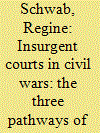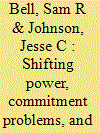| Srl | Item |
| 1 |
ID:
160879


|
|
|
|
|
| Summary/Abstract |
As part of research on the meso-foundations of conflict, the field of ‘rebel governance’ examines political institutions that regulate the affairs of civilians in wartime as well as their relations with armed actors. Judicial institutions play an important role in this and research has shown that they are widespread among both historical and current insurgencies. However, usually these bodies have been analysed in the context of one hegemonic faction like the Tamil Tigers in Sri Lanka and the Afghan Taliban. What is missing so far is an analysis of different pathways of (trans)formation of rebel courts. As exemplified by the three case studies of judicial institutions in Eastern Ghouta, Idlib and Aleppo, these are shaped by the distribution of power between ‘same-side’ groups, yielding unipolar, bipolar, or multipolar constellations. The analysis is located on the meso or movement level of insurgent social structures, complementing research on the micro and macro levels.
|
|
|
|
|
|
|
|
|
|
|
|
|
|
|
|
| 2 |
ID:
163400


|
|
|
| 3 |
ID:
138304


|
|
|
|
|
| Summary/Abstract |
Many scholars argue that leaders' expectations about future shifts in the distribution of power can result in preventive war. If a leader expects her adversary to be significantly stronger in the future, the leader may choose to go to war with that adversary rather than bargain with a stronger adversary in the future. However, quantitative evaluations of this argument prove difficult, as they require a measure of leaders' expectations about future shifts in power rather than simply a measure of observed power. In this paper, we develop an empirical model of future power to create this measure. We then use that measure to evaluate the preventive war hypothesis. Our results support the preventive war hypothesis. Increases in a state's expected future probability of winning in war increase its probability of another state in a dyadic relationship initiating war against it.
|
|
|
|
|
|
|
|
|
|
|
|
|
|
|
|